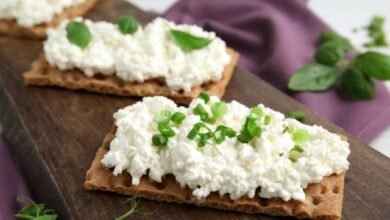9 Best Tips To Maintain a Healthy Weight in Your 50s

Maintaining a healthy weight as you age can feel like a constant battle with the scale. However, with the right strategies at your fingertips, it’s entirely possible. We’re here to help with nine of the best tips to maintain a healthy weight in your 50s, according to experts.
As with any phase of life, being overweight heightens your risk of chronic health issues like high blood pressure, diabetes, heart disease, stroke, and cancer. “The more weight someone has to carry around, the less likely they are to be active, and it becomes a downward spiral as the weight piles on,” explain The Nutrition Twins®, Tammy Lakatos Shames, RD, CDN, CFT, and Lyssie Lakatos, RD, CDN, CFT, who sit on our Medical Expert Board. “Just as importantly, being very underweight can negatively impact your health, even setting you up for heart disease and failure. If being underweight [results from] poor nutrition, it can compromise your immunity.”
Below, we’ll dive into some of the most productive habits to help you embrace your 50s while supporting your health and wellness goals. Let’s explore the best tips to maintain a healthy weight in your 50s.
Eat more.
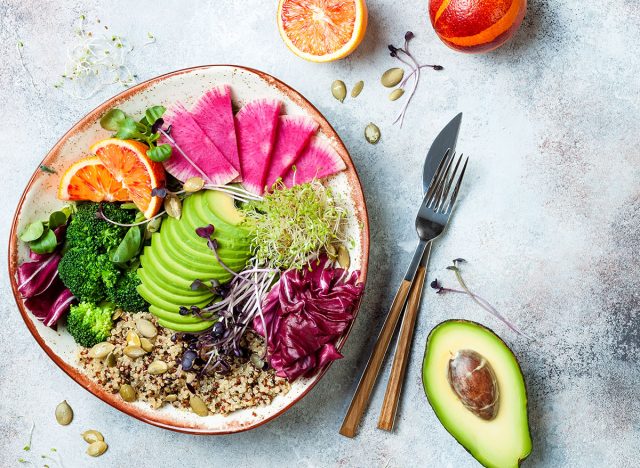
The Nutrition Twins encourage you to shift your focus to eating more.
“Women in their 50s love being told this since they typically hear that they need to cut back on everything they’re eating or they’ll gain weight due to the hormonal shifts that slow their metabolism,” they explain. “But the truth is that by focusing on the foods they should eat more of, they won’t put so much focus on the foods they’re trying to avoid, like sugar, processed and refined foods, and high-fat foods.”
Fill up your plate with the healthier, lower-calorie foods you’re trying to consume more of. This will make the weight maintenance process seamless.
Make the “2 Big Ps” a priority.

What are the “2 Big Ps,” might you ask? According to The Nutrition Twins, this method means prioritizing plants and protein in every meal and snack.
“Making sure you get these at each meal is critical when it comes to weight loss and weight maintenance,” The Nutrition Twins tell us. “Lean proteins like skinless chicken and turkey breast, eggs, Greek yogurt, tofu, fish, and seafood help to keep you satisfied, stabilize blood sugar (which becomes harder to manage as you get into your late 40s and 50s), and prevent the blood glucose dips that trigger the release of cortisol, the belly fat hormone.”
In addition, plant foods such as veggies, fruits, legumes, seeds, and nuts are chock-full of nutrients that give your metabolism fuel and your body satiating fiber.
Build more muscle.

If you want to stay lean, you need to build muscle. Muscles play a key role in revving up your metabolism, burning calories, and even helping you achieve a restful night’s sleep—all of which are crucial in weight loss and weight management. You can build muscle through exercise and incorporating high-protein foods into your diet—which leads us to our next point…
Perform strength training.

Grab your free weights and resistance bands because it’s time to amp up your strength training regimen.
“As you age, muscle mass naturally decreases, [which] can slow down your metabolism—a double whammy,” explains Ellen Thompson, CPT, Blink Fitness. “By incorporating strength training, you can maintain your muscle mass which will keep your metabolism boosted.”
If weights seem a bit intimidating, The Nutrition Twins suggest using your bodyweight to perform exercises like lunges, squats, pushups, planks, and crunches.
Get in your steps.
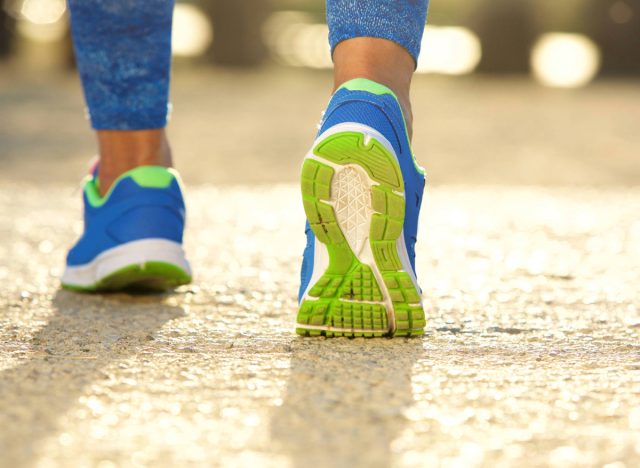
Don’t sleep on cardio! Adding more steps and movement to your day can make such a difference in your results. Consider going for a brisk morning or post-work walk or taking meetings while getting your steps on a walking pad. The possibilities are endless.
“Not only does cardio help burn calories (therefore maintaining a healthy weight) but it also improves heart health,” says Thompson.
Incorporate fermented foods into your diet.
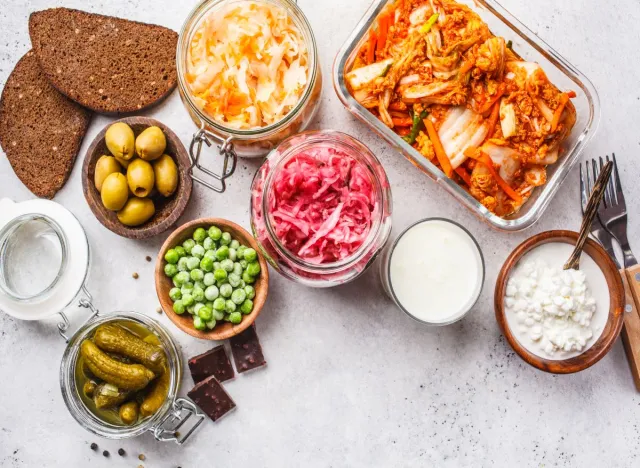
Fermented foods like yogurt, kimchi, sauerkraut, pickles, kefir, and kombucha not only taste delicious, but they’re also amazing for your gut health.
“[Fermented foods] decrease the detrimental bacteria in your gut while increasing the good bacteria, positively impacting the microbiome,” The Nutrition Twins point out. “Research has found that a more diverse microbiome with more ‘good’ bacteria is associated with less body fat, less visceral fat, and a lower BMI.”
Avoid plastic water bottles and food packaging.
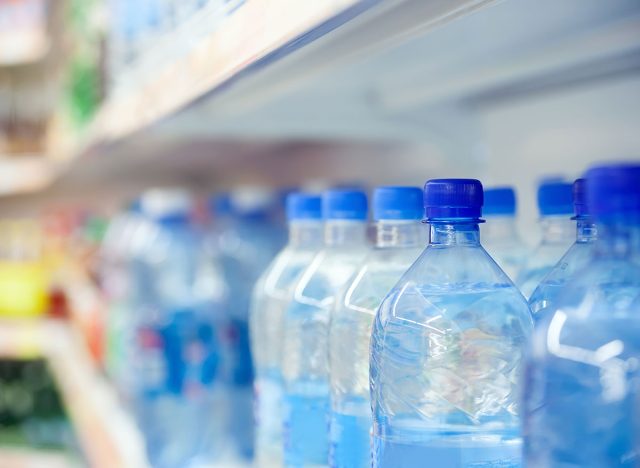
Did you know that plastics are also known as “obesogens?” Research shows that items like plastic water bottles and food packaging can wreak havoc on your hormones and lead to weight gain.
“By the time you enter your 50s, the accumulation of endocrine disrupters has added up, and it’s harder for your liver to filter out these obesogens,” The Nutrition Twins explain. “Over time, microplastics in the liver and kidney have been shown to increase the accumulation of fat cells.”
Power down blue light devices before bedtime.

Getting a solid, uninterrupted night’s rest is essential for weight maintenance and an all-around healthy lifestyle. Research shows that shorter sleep durations are linked to obesity and the risk of gaining weight in the future.
“Sleep deprivation triggers cravings, offsets hunger and satiety hormones and cues, slows metabolism, and interferes with metabolism and muscle growth,” The Nutrition Twins tell us. “One of the things that negatively impacts sleep the most is looking at devices—not only does it overstimulate the brain when you want the brain to stay calm, but the blue light emitted by phones, computers, and TVs negatively impacts the body’s natural circadian rhythm.”
Drink plenty of water.

Staying hydrated is the name of the game in weight management. Drinking plenty of water throughout the day is a simple task, yet many of us place it on the back burner amid our busy schedules.
“Thirst sensation diminishes with age, so staying hydrated is more crucial than ever,” explains Thompson. “It is essential for your overall health but can also help manage your appetite.”
Consider investing in a water bottle that reminds you when it’s time for a refill. It’s a worthwhile investment!





